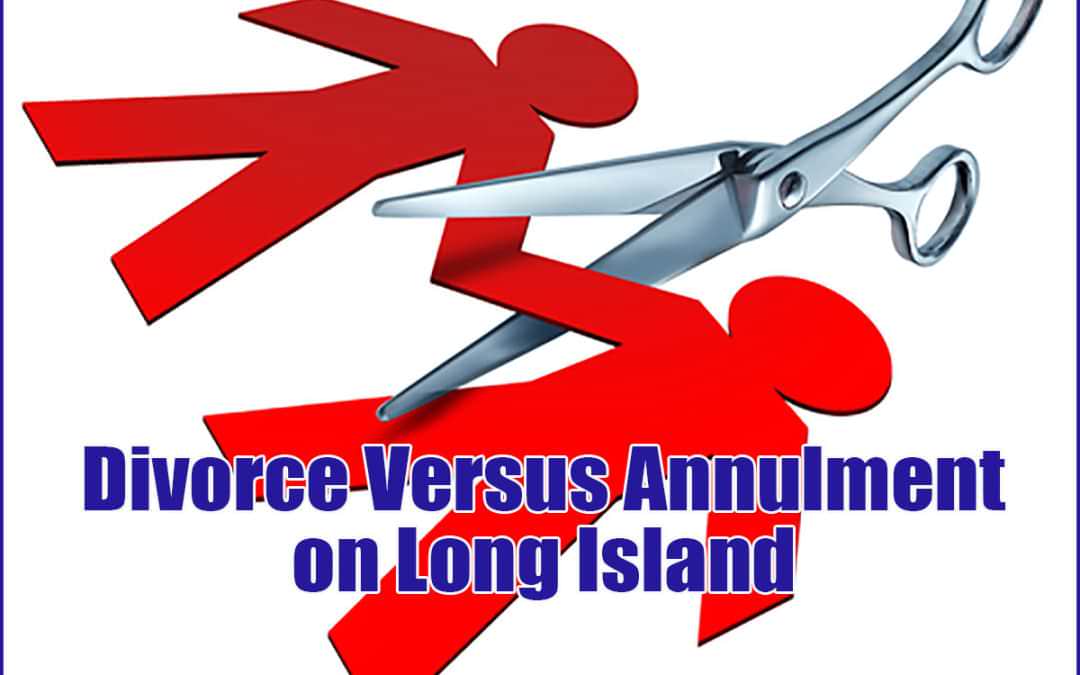
by Robert E. Hornberger, Esq | Dec 22, 2015
As a Family Law Attorney practicing in Suffolk County and Nassau County, Long Island, I am often asked by my clients about getting a marriage annulment. While a finalized divorce can end a marriage, an annulment can result in the marriage being declared void or invalid by a court order. Essentially, an annulment is different from a divorce in the sense that it is as though the marriage never took place in the eyes of the law. Keep in mind that obtaining a legal annulment does not constitute a religious annulment, which can only be granted by a church or clergy.
In certain cases, an annulment is the appropriate resolution of a marriage when a spouse can prove that the marriage was never legally valid. New York Domestic Relations Law Section 140 sets forth the grounds for and effects of annulment.
On Long Island, New York, a divorce can be granted upon the written, sworn testimony of the parties without a trial. In contrast, an annulment requires a hearing before a judge. One of the very specific grounds for annulment must be proven in court. For this reason, an annulment is more difficult to obtain for most marriages.
While a divorce can be based upon “irretrievable breakdown” in the marriage or a consensus that the marriage is unsuccessful, an annulment will not be granted based solely upon the parties’ desire for an annulment. Annulments can only be granted by court in Suffolk County or Nassau County in very specific circumstances. For an annulment, one of the below grounds must be conclusively proven in court.
Grounds for Annulment in Nassau County, Suffolk County, Long Island
There are five grounds upon which an annulment can be granted in New York:
1. One or both spouses were under the age of 18 at the time of the marriage. In New York, the marriage of any person under the age of 18 requires the written consent of both parents. Marriage of any person under the age of 16 needs the additional approval by a judge. If indeed one of both spouses was underage and the legal requirements were not met, this ground for annulment is waived if the spouses continue to cohabitate or live together after both have reached the age of 18.
2. One or both spouses were unable to consent to the marriage due to mental incapacity. For example, if a spouse could not give actual consent to the marriage because of lack of understanding of the nature, effect, or consequences of marriage as a result of some mental incapacity.
3. Either spouse is physically unable to have sexual intercourse. Physical capacity is needed to consummate a marriage with sexual intercourse. If the parties did not know of the physical incapacity at the time of the marriage, this can be a ground for annulment so long as the annulment is requested within the first five years of marriage.
4. Either spouse was incurably mentally ill for at least five years. If the spouse that suffers from mental illness has a period of sound mind and continues to freely cohabitate throughout this time, the marriage may be considered ratified. Mental illness as a ground for annulment may be waived if this is the case.
5. The marriage consent was obtained by duress, coercion, or fraud. If a spouse entered the marriage due to pressure or fraud. A fraudulent marriage may occur when a spouse entered the marriage for the purpose of obtaining immigration status. Another example is where a spouse claimed to be pregnant in order to induce the other party to marry them. These and similar situations may constitute a fraudulent marriage subject to annulment.
Legal Annulment is Different Than Religious Annulment
A marriage can also be declared to be a nullity by a court. This means that the marriage is automatically void and will not be legally recognized. While the record of marriage and annulment will still exist, the parties can consider themselves to have never been married. This can occur in the case of incestuous marriages or bigamous marriages, as these types of marriages are not legal in New York. A spouse in a void marriage can bring an action in court asking for a declaration of the nullity of a void marriage.
Even after a marriage is annulled and the spouses consider themselves to never have been married, children of the marriage will still be considered legitimate children of married parents. Parents will still be legally responsible for the children in terms of custody, visitation, and child support, and will be subject to relevant laws. Furthermore, the annulled marriage will still be subject to the state laws regarding division of marital property.
If you are in Nassau County, Suffolk County, or the five boroughs of New York City, and you have questions about annulment and whether your marriage may be void or voidable, reach out to the Office of Hornberger Verbitsky, P.C. for a free consultation. Call us at 631-923-1910 or fill out the short form on this page and we’ll get right back to you.
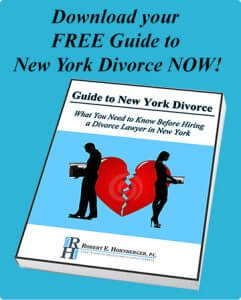
Download our Free New York Divorce Guide
Our 41-page “Guide to New York Divorce: What You Need to Know Before Hiring a Divorce Lawyer in New York” written by an experienced family law attorney Long Island’s Robert E. Hornberger, Esq., provides you with real information on the divorce process and the laws it rests upon in the state of New York. This book will help give you a solid foundation upon which you can begin the process of making your family’s, life better. Download your Free Guide to New York Divorce here.

by Robert E. Hornberger, Esq | Dec 15, 2015
Domestic Violence and Orders of Protection on Long Island, New York
As a family law attorney serving Suffolk County and Nassau County residents of Long Island, I am saddened to see a number of domestic violence cases each year.
For a person experiencing family violence, including threats or other abusive behavior, an Order of Protection is a helpful tool that can help to limit the behavior of the offender.
In Suffolk County or Nassau County Family Court, these orders are often between a current and former spouse, a person with whom the victim has a child in common, another family member related by either blood or marriage, or a person with whom the victim has had an intimate relationship. Many Orders of Protection in New York are “limited” in that they allow contact between the offender (also known as the respondent) and victim (also known as the petitioner) so long as there is no harassment, physically abusive behavior, or other intimidating or threatening conduct.
Orders of Protection Vary in Nassau County and Suffolk County Family Courts
Orders of Protection can vary greatly depending on the circumstances of each case and the reason the order is needed. Orders of Protection can instruct an offender to “stay-away” from the victim and the victim’s children and/or to “refrain from” certain abusive behaviors or activities. In certain circumstances, an Order of Protection may direct the offender to move out of the home in order to protect the victim. An order will likely direct the offender to refrain from threats, intimidation, or physical abuse. The Order of Protection can also instruct the offender to follow custody orders, pay child support, to not have a gun, or to stop calling or texting the victim.
In Suffolk County & Nassau County, Orders of Protection Issued by Family Court, Criminal Court & Supreme Court
Orders of Protection may be issued by the Family Court, Criminal Court, or Supreme Court. The existence of any other legal proceeding involving the parties may determine which court issues the Order. For example, for couples involved in a divorce, an Order of Protection may be issued in Supreme Court where the matrimonial proceeding is pending. For parties involved in a domestic violence or other criminal charge in Criminal Court, the Criminal Court may issue the order. And, finally, a family member may petition the Family Court for an Order of Protection.
Family Offense Petition
In Family Court, the victim may wish to file what is called a “Family Offense Petition.” The petition should contain all of the relevant information, including the conduct and behavior that caused them to believe the protective order is necessary. Once the petition is filed, a temporary order of protection may be issued until the other party has a chance to appear in court. Once the court determines that, based on the petition, an Order of Protection may be necessary, both parties will be asked to appear in court. The judge will decide which terms and conditions are to be included in the order based upon the nature of the offense and conduct in the petition.
Orders of Protection Can Be Useful Deterrents for Abusive Behavior on Long Island
An Order of Protection is often a useful deterrent for abusive behavior. It is a crime to violate an Order of Protection. The Order acts as probable cause for an arrest if police are called to a scene of a domestic dispute. This means that the police will not have to use judgment in determining whether to arrest the offender at the scene; the order of protection will allow the police to arrest if it appears that the Order of Protection is being violated. Any violation of an Order of Protection can result in new criminal charges. It is important for offenders to know that even if the victim/petitioner initiates the contact, it does not excuse the violation of the Order of Protection.
If you believe that you may need an Order of Protection, or if an Order of Protection has been issued against you, it is important that you speak with an experienced attorney to know your rights and options. The Law Office of Hornberger Verbitsky, P.C. can assist you with your Family Law and Divorce Law matters in Nassau County and Suffolk County. Contact our office at 631-923-1910 or fill out the short form on this page to schedule your free consultation.

Download our Free New York Divorce Guide
Our 41-page “Guide to New York Divorce: What You Need to Know Before Hiring a Divorce Lawyer in New York” written by an experienced family law lawyer Long Island’s Robert E. Hornberger, Esq., provides you with real information on the divorce process and the laws it rests upon in the state of New York. This book will help give you a solid foundation upon which you can begin the process of making your family’s, life better. Download your Free Guide to New York Divorce here.
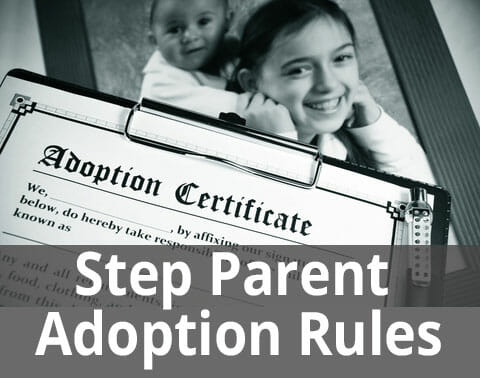
by Robert E. Hornberger, Esq | Dec 8, 2015
HOME ABOUT US OUR FIRM FIRM YOUR LEGAL TEAM ATTORNEYS YOUR ATTORNEYS ROBERT E HORNBERGER CHRISTINE M VERBITSKY ANNEMARIE LANNI LAWRENCE M. MARINO BRENDA LYNCH (Of Counsel) PRACTICE AREAS AREAS OF EXPERTISE What’s Involved In Divorce DIVORCE DIVORCE COLLABORATIVE...
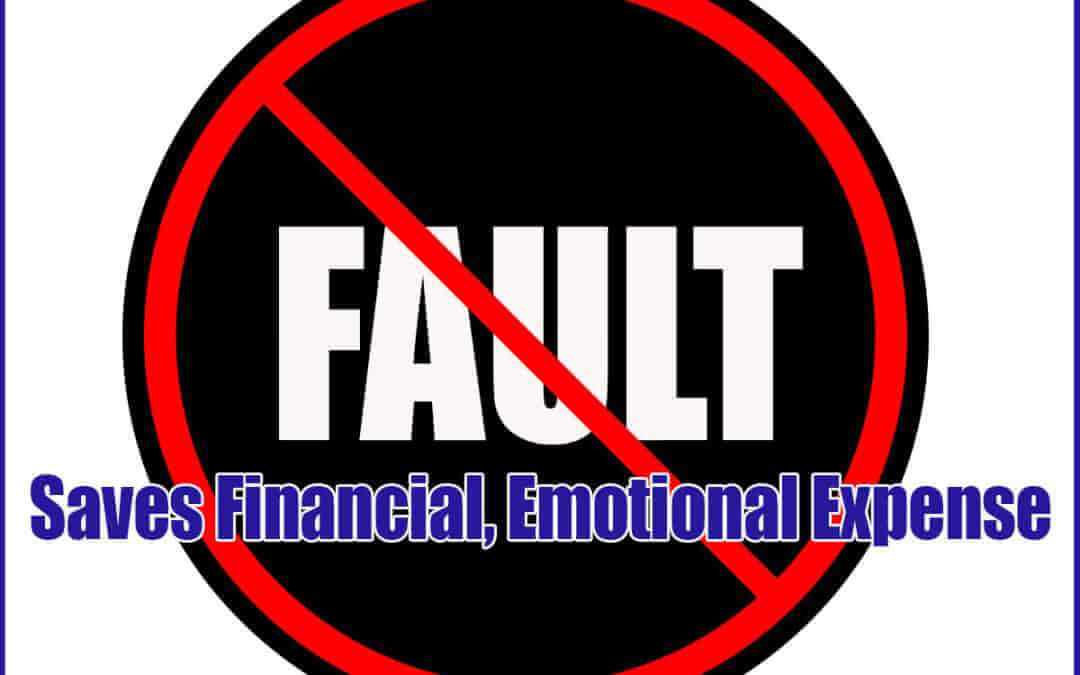
by Robert E. Hornberger, Esq | Nov 24, 2015
As an experienced Long Island Family Law Attorney practicing in Nassau County and Suffolk County courts, I have seen first-hand how the No-Fault divorce law has simplified the process and removed a lot of the emotional and financial costs of divorce in New York.
Long Island No-Fault Since 2010
Since 2010, divorce law in New York allows married couples to divorce without assigning blame to one party. The No-Fault Divorce law allows couples who wish to dissolve their marriage to do so without providing that a spouse committed an act such as cruelty, adultery or abandonment as previously required. The grounds for a “no-fault divorce” include demonstrating that the marriage has “broken down irretrievably” for a period of at least six months, which is in many states referred to as having “irreconcilable differences.” The couple need not live in separate residences for six months, but must allege that the marriage has been “broken down” for at least that period of time. A judgment of divorce will not be granted on the grounds of “irretrievable breakdown” until after marital property distribution, custody and visitation, and spousal and child support have all been decided.
No-Fault Spares Nassau Suffolk Couples Time, Stress, Money
By removing the need to prove fault in order for divorce to be acknowledged by the State of New York, divorcing couples and the courts are spared the time consuming and costly litigation over whether a divorce should be granted and why. Instead, the focus is shifted to an outcome that is in the best interests of the children and family, and an equitable division of marital assets. The “broken down irretrievably” is a more neutral ground for divorce upon which the divorcing parties can often agree. However, it is still up to the parties to make a showing that the relationship has, in fact, “broken down irretrievably.”
Fault Divorce Still Possible, but Costly on Long Island
An “at-fault divorce” is still possible in New York. If one party accuses the other of wrongdoing, such as adultery, an at-fault divorce may be effectuated if the other party admits to the wrongdoing, or if the wrongdoing is conclusively proven in court. The party accused of cheating may or may not choose to contest the allegation. The parties may instead use the question of infidelity in negotiation as they make decisions and compromise to achieve the divorce.
Because of the increased emotional nature of allegations of adultery, abandonment, or cruelty, many couples make the choice to file for divorce on the grounds of “irretrievable breakdown” even when there has been adultery, abandonment, or cruelty. This spares a party of the litigation of a contested divorce, including the need to prove that adultery, abandonment, or cruelty did in fact occur.
Adultery Tough to Prove in Nassau Count, Suffolk County Court
Adultery can be quite difficult to conclusively prove in court. Proof of adultery requires corroborating evidence from a third party witness. The accusing spouse will not be permitted to testify. Even an admission by the accused party that he or she did, in fact, cheat is not legally admissible evidence on which to grant a judgment of divorce. The accusing party may also need to show that he or she did not encourage the behavior, forgive the behavior, or learn of the behavior more than five years prior. This type of litigation can be extremely stressful, personally intrusive, and potentially damaging to the reputation of both parties.
No-Fault Reduces Emotional Toll of Divorce on Long Island
Similarly, in a case of cruel and inhuman treatment, it may be quite difficult for an abused spouse to provide conclusive proof upon which the court can base a judgment of divorce. A victim of domestic violence who wishes to file for divorce might consider a no-fault ground rather than the “cruel and inhumane treatment ground” in order to avoid any continued trauma that could result from a divorce proceeding in which he or she might be forced to engage in a lengthy adversarial proceeding with the abuser.
Proving Fault Doesn’t Mean You’ll Get More From Spouse in Nassau County or Suffolk County Court
It may also come as a surprise that a wrongdoing such as adultery may have only a slight impact, if any, on the outcome of the divorce. The assignment of blame does not necessarily change the equitable distribution awards or the apportionment of marital assets. The judge will still focus on fairly splitting the assets and what type of custody or visitation with the children is in the best interests of the children and family as a whole. Many factors are considered by the judge in order to determine the appropriate distribution of assets and custody of children. To the dismay of the betrayed spouse, evidence or an accusation of adultery may have little effect on this calculation.
Consult an Experienced Family Law Attorney on Long Island Before Seeking a Fault Divorce in Nassau County or Suffolk County
Married couples dealing with the infidelity or abuse of a spouse should seek the advice of a skilled divorce attorney. If the terms of the divorce can be resolved privately between the parties in mediation, the spouses can be spared the time, stress, and cost of an adversarial proceeding while achieving mutually agreeable results. Reach out to an experienced Long Island Family Law Attorney at the Offices of Robert E. Hornberger, P.C. at 631-923-1910 or fill out the short form on this page to schedule a free divorce consultation with a skilled expert on your matrimonial concerns.

Download our Free New York Divorce Guide
Our 41-page “Guide to New York Divorce: What You Need to Know Before Hiring a Divorce Lawyer in New York” written by an experienced family law attorney Long Island’s Robert E. Hornberger, Esq., provides you with real information on the divorce process and the laws it rests upon in the state of New York. This book will help give you a solid foundation upon which you can begin the process of making your family’s, life better. Download your Free Guide to New York Divorce here.
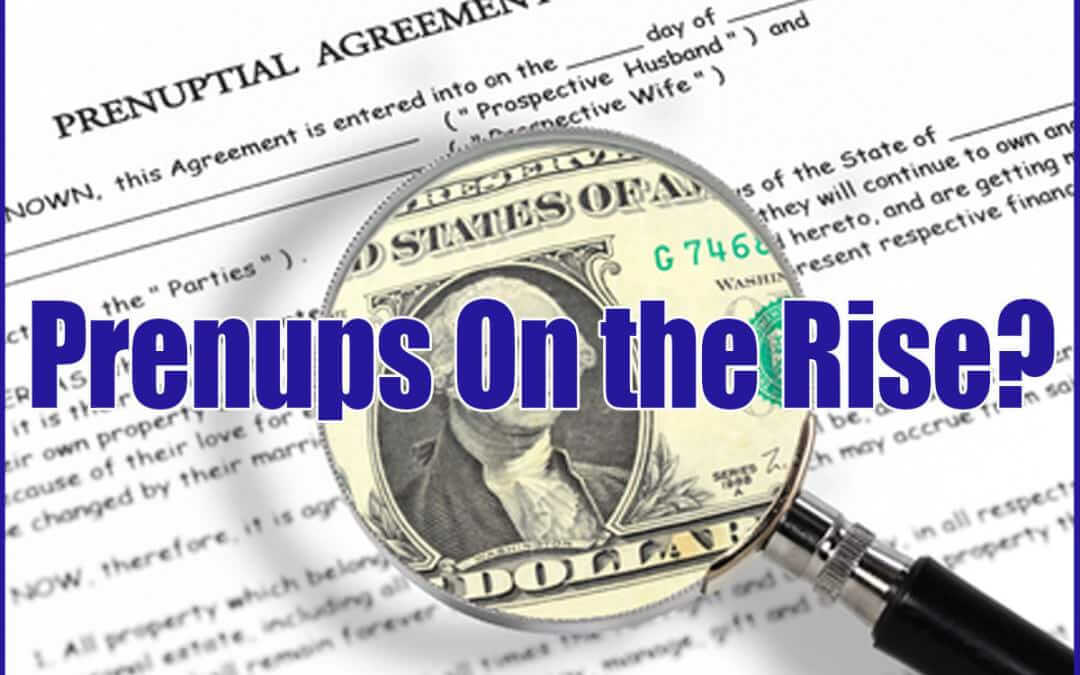
by Robert E. Hornberger, Esq | Nov 17, 2015
As a Family Law Attorney practicing in Nassau County and Suffolk County, Long Island, I have seen as more and more couples wait until they are more established in their careers before marrying, and the increase in second or even third marriages, the number of couples looking to have pre-nuptial agreements has also increased.
What is a Prenuptial Agreement on Long Island?
A prenuptial agreement, or ante nuptial agreement as it is called in New York State Law, is a contract agreement between two individuals prior to the marriage that describes the legal rights of the parties upon divorce or the death of one of the parties. This type of agreement commonly addresses issues of division of property as well as spousal or child support in order to avoid disagreement or litigation if divorce were to occur in the future. Prenuptial agreements are tailored to suit each couple’s unique needs, and provide protection to those entering a marriage contract on Long Island.
Prenuptial agreements can establish each spouse’s right to property, assets, and debts in the event of death or divorce, the right of each spouse to buy, sell, lease, or otherwise control property during the marriage, and each spouse’s right to spousal support or death benefits.
Why Get a Prenuptial Agreement?”
Couples might wish to sign a prenuptial agreement in order to clarify their rights and expectations prior to entering the marriage. As many people on Long Island now wait until a relatively older age to marry, individuals in Nassau County or Suffolk County going into a marriage may have accumulated more income and assets that they wish to protect than we have seen in the past. For individuals marrying for a second or third time, the importance of a prenuptial agreement may be paramount to ensure their future financial security in case of a divorce.
Prenuptial Agreements Can Change the Outcome of Equitable Distribution on Long Island
Couples signing a prenuptial agreement should understand that their divorce may be governed by this document, and, so long as the contract was skillfully drafted and properly executed (the document must be in writing, signed, and properly executed in front of notary public in order to be valid), they will no longer be subject to the New York’s Equitable Distribution laws. Under the Equitable Distribution law, marital property is divided based upon what a Long Island court may see as equitable, and may entitle a spouse to a far greater share of marital property than that provided by a prenuptial agreement.
Prenuptial Agreements Can Protect Your Inheritance
A prenuptial agreement may also provide for a spouse’s right to inheritance upon the death of her spouse. The rights of inheritance imparted by a prenuptial agreement can differ from the law of the state. Under New York Law, if a spouse dies without a prenuptial agreement governing the inheritance, the surviving spouse will be entitled to anywhere between $50,000 up to one half of the decedent’s estate, regardless of what the decedent spouse’s will says. This is known as the elective share. However, if a valid prenuptial agreement has been signed, the agreement will preempt the elective share law, and the surviving spouse will be entitled to whatever terms to which she agreed prior to the marriage. In many cases, a less wealthy spouse will receive less under a prenuptial agreement than she would under the New York State Laws governing divorce and inheritance.
Prenuptial Agreements Don’t Circumvent the Law on Long Island
There are some situations upon which a prenuptial agreement may be invalidated. For example, if a person deliberately hides assets in order to induce a spouse into agreeing to a low level of support under a prenuptial agreement, a court may declare the agreement invalid. If a spouse was unduly pressured or coerced into signing the agreement, it may also be invalid. For example, if a prenuptial agreement is presented to a spouse on the day before the wedding, a court might determine that the agreement was signed under duress and is therefore invalid.
Prenuptial Agreements & Child Custody, Visitation in Nassau County and Suffolk County
Insofar as a prenuptial agreement can govern child custody and visitation, that portion of the agreement is valid only if the couple already had children at the time that the agreement was signed. Otherwise, it is not valid in this regard. Even if the couple had children prior to marriage, a judge will make the final decisions regarding custody and support to ensure that the best interests of the child are protected.
Couples are given freedom to create the terms of the prenuptial agreement in any way that they feel is best suited for their personal circumstances. For example, the law does not mandate that a prenuptial agreement provide spousal support. Courts in Nassau County and Suffolk County will honor the private agreements so far as its covenants are legal; a court will not honor the agreement if it requires a spouse to commit a crime, condone domestic violence, or prevent a spouse from prosecuting a crime.
Experienced Long Island Family Law Attorney Recommends you Ensure Your Prenuptial Agreement Protects You & Is Enforceable on Long Island
It is important that both parties to a prenuptial agreement in Nassau or Suffolk County on Long Island seek the advice of an experienced Family Law attorney. The Law Offices of Robert E. Hornberger, P.C. can assist you in navigating the process of entering into a prenuptial agreement, ensure your rights are protected and ensure that the agreement can be legally enforced in the future. Contact us at 631-923-1910 or fill out the short form on this page and we’ll get right back to you to set up a free consultation to discuss your needs.
For more information about Prenuptial and Postnuptial Agreements, please read Your Guide to Long Island Prenuptial & Postnuptial Agreements

Download our Free New York Divorce Guide
Our 41-page “Guide to New York Divorce: What You Need to Know Before Hiring a Divorce Lawyer in New York” written by an experienced family law attorney Long Island’s Robert E. Hornberger, Esq., provides you with real information on the divorce process and the laws it rests upon in the state of New York. This book will help give you a solid foundation upon which you can begin the process of making your family’s, life better. Download your Free Guide to New York Divorce here.

by Robert E. Hornberger, Esq | Oct 27, 2015
As a Long Island Family Law lawyer practicing in Nassau County and Suffolk County, I have seen some very special relationships between grandparents and their grandchildren.
The relationship between a grandparent and grandchild is often an important part of family life and child development because grandparents often offer a source of steady, experienced support throughout a child’s upbringing. Although there is a legally recognized value in the grandparent-grandchild relationship, the complexity of family dynamics and relationships often make the determination of grandparent rights difficult. Courts in Nassau County and Suffolk County on Long Island, New York often view the facts on a case-by-case basis. As an increasing number of grandparents care for grandchildren while both parents work outside the home and play an important role in a child’s life, grandparents’ rights have become an increasing concern for all family members.
The rights of grandparents to visitation with grandchildren on Long Island are governed by New York State Domestic Relations Law Section 72. Grandparents have the right to petition for visitation rights with their grandchildren; however, this section of the law merely serves as a means by which grandparents may assert their rights to visitation – it does not grant an automatic right. Under certain circumstances, such as the death of one of the child’s parents, the law is relatively clear with respect to the grandparents’ right to maintain a relationship with the child. However, in other circumstances, such as where hostile relationships and animosity within the family result in barriers to grandparent visitation, grandparents’ rights become less clear. Nevertheless, the law exists to protect grandparents and grandchildren, and Section 72 has been applied uniquely to varying circumstances.
Grandparents may petition for visitation rights when they are deprived of contact with their grandchild because of (1) the death of their child, (2) the divorce of their child, or (3) the adoption of the grandchild. However, in some cases, the court may extend the grandparents’ rights to visitation to cases when visitation is being withheld by the parents.
While the best interests of the child are an important consideration and given significant weight by Nassau County and Suffolk County courts, in general, courts in New York also look at the impact of the visitation on the family as a whole. In fact, the Court of Appeals held that the best interests of the child cannot be the only factor considered in granting visitation to grandparents. Courts may also consider the rights of parents to educate and socialize their children in a way that they feel is appropriate.
The difficulty lies in weighing the best interests of the child against those of the parents, and even the family as a whole. For example, if an extraordinary circumstance exists, such as an extended disruption of custody in which the grandparents were the sole caretaker of the child, then the best interests of the child may be given increased weight in a court’s decision. A lengthy separation between a parent and child during which the child resided with the grandparents may suggest that the grandparents are the natural substitute guardians for the child, and that visitation should be granted.
In such circumstances where there is a lengthy separation between a parent and child, there is often an issue pertaining the parent’s stability or mental health, a factor which Nassau County or Suffolk County Family Courts will likely take into consideration upon hearing a petition for grandparent’s visitation rights. When the grandparents care for the grandchildren for years or even months at a time, there is a strong possibility that their rights will be protected by the law. In this situation, the best interests of the child are at stake in that denial of grandparent visitation after such an arrangement may be damaging to the child and result in the loss of a secure and stable relationship.
Family members may wish to enter into private, consensual agreements regarding child visitation to avoid what can often be a stressful experience in Nassau County Family Court or Suffolk County Family Court. Some may be of the opinion that grandparent visitation laws encourage courts to intervene in private family affairs. Indeed, compromise is often in the best interests of all involved. However, when a compromise cannot be reached, certain family members have rights that are recognized by the law.
It is also important to understand the difference between grandparent visitation and grandparent custody. Grandparent custody may be granted in instances of child abuse or neglect, or a termination of parental rights. Visitation may be granted to grandparents in cases where a child is adopted outside of the family, one of the child’s parents passes away or the child’s parents are divorced. However, in most cases, adoption of the child outside the family will foreclose any right of the grandparents to obtain custody of the child.
Questions About Child Custody and Visitation on Long Island?
See this page to learn everything you need to know about Child Custody and Visitation on Long Island.
To learn more about what you need to know about Child Custody on Long Island, visit this page on Child Custody or contact us at 631-923-1910 for a complimentary consultation.
Receive a Free Consultation from a Long Island Family Law Lawyer or Divorce Attorney Experienced in Grandparents Rights in Nassau County, Suffolk County, Long Island, NY
A Long Island family law attorney or divorce lawyer can best help you to protect your rights and interests concerning your family. Reach out to the Law Offices of Robert E. Hornberger, Esq. at 631-923-1910 for a free confidential consultation, or fill out the form on this page and we’ll get right back to you.
For more information about how to protect yourself and your children during your divorce in Nassau County of Suffolk County, contact a Long Island divorce attorney with great experience in child support and other divorce and family law matters. Long Island’s Robert E. Hornberger, Esq., PC and his compassionate and experienced divorce lawyers can help. Call us at 631-923-1910 for a complimentary, confidential consultation or fill out the short form on this page and we’ll get right back to you.
Download our Free New York Divorce Guide
 Our 41-page “Guide to New York Divorce: What You Need to Know Before Hiring a Divorce Lawyer in New York” written by an experienced divorce lawyer Long Island’s Robert E. Hornberger, Esq., provides you with real information on the divorce process and the laws it rests upon in the state of New York. This book will help give you a solid foundation upon which you can begin the process of making your family’s, life better. Download your Free Guide to New York Divorce here.
Our 41-page “Guide to New York Divorce: What You Need to Know Before Hiring a Divorce Lawyer in New York” written by an experienced divorce lawyer Long Island’s Robert E. Hornberger, Esq., provides you with real information on the divorce process and the laws it rests upon in the state of New York. This book will help give you a solid foundation upon which you can begin the process of making your family’s, life better. Download your Free Guide to New York Divorce here.
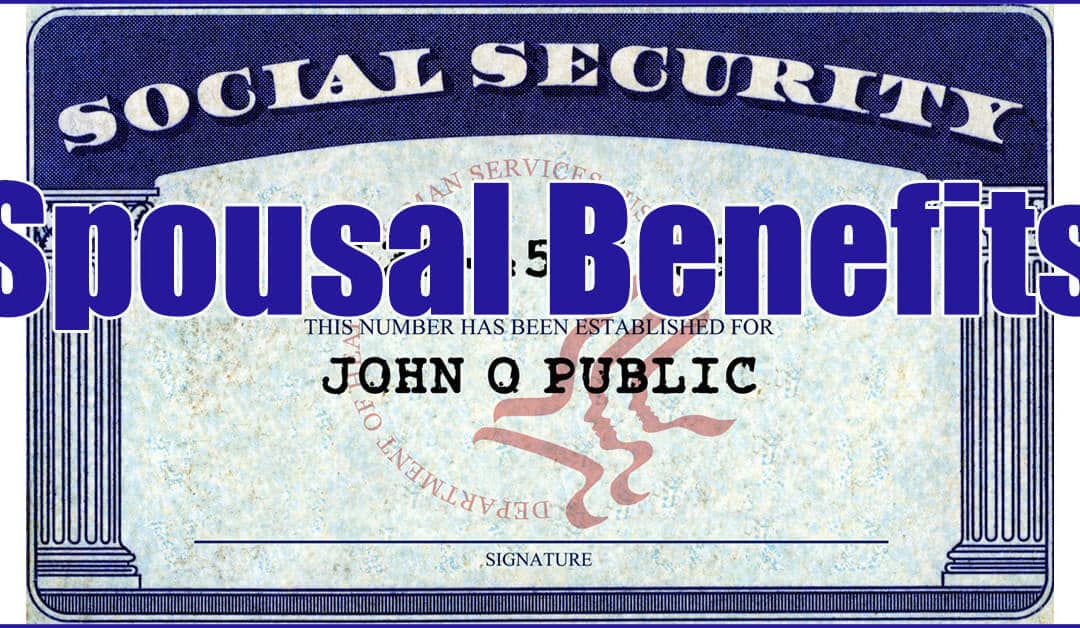
by Robert E. Hornberger, Esq | Oct 13, 2015
As a Long Island Family Law Attorney, we work with all areas of family law, not just divorce and child custody and child support issues. One area that is of particular concern to spouses is the Social Security Spousal Benefit.
The Social Security spousal benefit was created in 1939, at a time when it was common for only one spouse to work outside of the home. It allowed a nonworking spouse to benefit from her contribution to society and families to be protected from poverty upon the retirement or death of the earning spouse. Although today’s norm has both spouses working outside the home, social security spousal benefits provide many married couples with financial security in the retirement years or upon the death of a spouse.
The availability of increased social security benefits for spouses is an often overlooked benefit of exchanging marital vows. While it can sometimes be confusing to determine when and how to take social security benefits in order to maximize social security income, it is crucial that spouses take the time to explore the availability and flexibility of this benefit. Spouses have options in terms of when and how to take advantage of the benefits offered by social security, and a trusted professional should be consulted to help you determine the best course of action for a married couple’s particular needs.
While reading this article, keep in mind that the “spousal benefit” is an entirely different election than the “individual benefit.” Each spouse, dependent upon his or her lifetime earnings, will be eligible to take an individual benefit. In contrast, the spousal benefit is the greater of:
- The social security benefit based upon his or her own earnings, or
- A benefit based upon up to half of the spouse’s individual benefit.
The amount of the spousal benefit is based on two factors:
- The benefit amount that a spouse would receive at his or her full retirement age and
- The age at which a spouse starts receiving the benefit.
The spousal benefit is a percentage of the amount he or she would receive at his or her full retirement age. At the full retirement age, this percentage is 50 percent of a spouse’s individual benefit.
Whether a married couple consists of one or two working spouses, or a primary earner and one that has earned significantly less over the course of his or her lifetime, a combination of factors may indicate when and how it is best to apply for the spousal benefit. Spouses who have not earned enough to qualify for social security benefits on their own may still be eligible to receive a spousal benefit. In such an instance, the non-earning spouse may wish to take the spousal benefits earlier rather than wait until full retirement age.
Similarly, spouses who are independently eligible but have a lower income than their partner can get a combined benefit that equals the benefit of the higher spouse. Keep in mind that your income is not reduced because your spouse also receives social security! Whether one or both spouses take the benefit, both individuals can capitalize on their benefits. A spouse can collect whichever benefit is greater, whether that be the spousal benefit or the individual benefit based upon the spouse’s own earnings.
The earlier that social security benefits are taken, the lower the percentage of benefits. This is because a married couple earns a limited total amount based upon lifetime earnings and, if the benefit is taken earlier, the total amount must be spread out over a longer period of time.
The earliest that a spouse may take the spousal benefit is at the minimum retirement age of 62, at which time the spousal benefit is 30 of the total benefit of the higher-earning spouse at full retirement age (66). At 66, the spousal benefit is the greatest percentage: 50% of the social security benefits that the higher-earning spouse will receive at full retirement age.
Waiting until full retirement age to apply for spouse’s benefit will result in receiving the maximum monthly amount. Provided a spouse has attained the age of 62, he or she may start his or her own benefits at any time. However, he or she cannot take a spousal benefit until the spouse has started taking his own individual benefit. A strategy known as “file and suspend” may allow a spouse to file for his benefits, and then suspend them, so that his spouse can begin to collect a spousal benefit while he can still take the benefit of waiting until full retirement age to take his own benefits.
Finally, the spousal benefit is available to spouses, divorcees, and widows and widowers. A scarcely known “loophole” exists where multiple ex-spouses can collect the same, full spousal benefit from the higher earning spouse. Again, a trusted professional can help you and your spouse learn the “who, when, and how” of taking social security benefits and spousal benefits in order to best suit your individual needs.
For further information, contact a trusted professional or visit www.ssa.gov.
Receive a Free Consultation from an Experienced Divorce Attorney Practicing in Nassau County, Suffolk County, Long Island
To learn more about what you need to know about Family Law Courts on Long Island and how to get help to protect yourself and your future, visit this page: https://divorce-longisland.com/what-cases-family-law/ For more information about how to protect yourself and your children during your divorce in Nassau County of Suffolk County, contact a Long Island divorce attorney with great experience in all divorce and family law matters. Long Island’s Robert E. Hornberger, Esq., PC and his compassionate and experienced divorce lawyers can help. Call us at 631-923-1910 for a complimentary, confidential consultation or fill out the short form on this page and we’ll get right back to you.
Download our Free New York Divorce Guide
 Our 41-page “Guide to New York Divorce: What You Need to Know Before Hiring a Divorce Lawyer in New York” written by an experienced divorce lawyer Long Island’s Robert E. Hornberger, Esq., provides you with real information on the divorce process and the laws it rests upon in the state of New York. This book will help give you a solid foundation upon which you can begin the process of making your family’s, life better. Download your Free Guide to New York Divorce here.
Our 41-page “Guide to New York Divorce: What You Need to Know Before Hiring a Divorce Lawyer in New York” written by an experienced divorce lawyer Long Island’s Robert E. Hornberger, Esq., provides you with real information on the divorce process and the laws it rests upon in the state of New York. This book will help give you a solid foundation upon which you can begin the process of making your family’s, life better. Download your Free Guide to New York Divorce here.
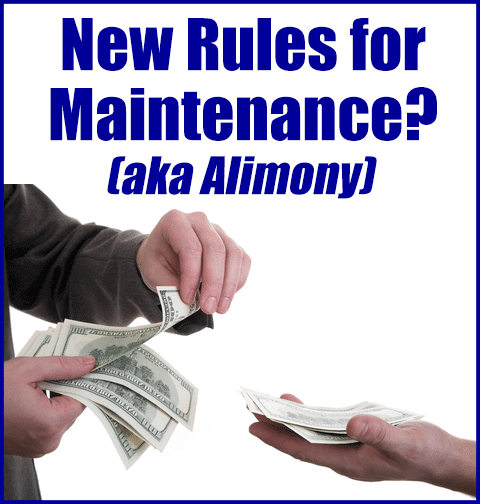
by Robert E. Hornberger, Esq | Jul 16, 2015
As a divorce lawyer on Long Island, during the initial consultation I discuss the five major issues in every Long Island Divorce:
- Spousal Maintenance (aka Alimony)
- Child Custody
- Child Support
- Real Property
- Equitable Distribution
When discussing spousal maintenance with clients or potential clients, I find that most people are still using the archaic term “alimony.” As divorce attorneys practicing in Suffolk County and Nassau County, we know that that “alimony”, per se, has been abolished but that spousal maintenance now has taken its place. However, most people view these two words as one in the same.
What’s the Difference Between Alimony and Spousal Maintenance?
The term alimony dates back centuries and was generally only granted to the wife to be paid by the husband. Spousal maintenance, on the other hand, can be awarded to and paid by either spouse. Because husbands are not always a family’s sole or primary wage earner as was once believed, the New York State legislature made it possible for either spouse to receive an award of post-divorce spousal maintenance.
How is a Spousal Maintenance Award Determined in Long Island Divorce?
If the Court were to grant you a post-divorce spousal maintenance award today, the amount and duration of that award would be based upon your personal situation, as well as a multitude of factors. These factors include but are not limited to:
- Length of the marriage
- General health of both you and your spouse
- Earning capability of both you and your spouse
- Wasteful dissipation of marital assets
- With whom your children will reside
There is no set formula for spousal maintenance in New York and therefore there is a large disparity in the duration and amount of spousal maintenance awarded on each case.
Because of this wide discrepancy, I am reluctant to give a definitive answer when clients ask how much spousal maintenance they are entitled to and for how long. However, on June 30, 2015 a bill passed in both the New York State Assembly and Senate which sets forth a precise formula for calculating post-divorce spousal maintenance awards. Likely as I sit here writing this blog, this bill is waiting on the Governor’s desk for his signature to be passed into law.
The Proposed Post-Divorce Spousal Maintenance Bill
First and foremost, the legislature proposed an income cap on post-divorce spousal maintenance awards of $175,000 (this number will change each year in accordance with the consumer price index).
Post-Divorce Spousal Maintenance and Child Support
- If you are the payor spouse and your income is lower than or equal to the income cap, and you will also be paying child support on behalf of your children, there are two formulas which, if the bill is passed, will be used to calculate post-divorce spousal maintenance awards.
- The first formula is as follows: 25 percent of the payee spouse’s income shall be subtracted from 20 percent of the payor spouse’s income.
- The second formula is as follows: the payor spouse’s income and payee spouse’s income shall be added together and then multiplied by 40 percent. The payee spouse’s income shall then be subtracted from the sum derived from this calculation.
- The post-divorce spousal maintenance award shall be the lower of the amounts derived from the two aforementioned formulas.
What if I am Not Paying Child Support?
If you are the payor spouse but you will not be paying child support on behalf of your children, or you do not have children and therefore there is no issue of child support, the following two formulas shall be used to determine a post-divorce spousal maintenance award.
- The first formula is as follows: 20 percent of the payee spouse’s income shall be subtracted from 30 percent of the payor spouse’s income.
The second formula is as follows: the sum of the payee spouse’s and payor spouse’s income shall be multiplied by 40 percent. The payee spouse’s income shall then be subtracted from the sum derived from this calculation.
In both scenarios the post-divorce spousal maintenance award shall be the lower sum of the amounts derived from the two aforementioned formulas.
Receive a Free Divorce Attorney Long Island Consultation
To learn more about what you need to know about spousal maintenance (alimony) on Long Island and how to get help to protect yourself and your future visit this page: Spousal Maintenance / Alimony on Long Island, NY. If you have concerns about spousal maintenance and what the new legislation may mean to your divorce, contact an experienced Long Island divorce lawyer. Long Island’s Robert E. Hornberger, Esq., PC and his compassionate and experienced divorce lawyers can help. Call us at 631-923-1910 for a complimentary, confidential consultation or fill out the short form on this page and we’ll get right back to you
Check out our Divorce Guide for Dads for more information about divorce issues specifically related to fathers.
Download our Free New York Divorce Guide
 Our 41-page “Guide to New York Divorce: What You Need to Know Before Hiring a Divorce Lawyer in New York” written by an experienced divorce lawyer Long Island’s Robert E. Hornberger, Esq., provides you with real information on the divorce process and the laws it rests upon in the state of New York. This book will help give you a solid foundation upon which you can begin the process of making your family’s, life better. Download your Free Guide to New York Divorce here.
Our 41-page “Guide to New York Divorce: What You Need to Know Before Hiring a Divorce Lawyer in New York” written by an experienced divorce lawyer Long Island’s Robert E. Hornberger, Esq., provides you with real information on the divorce process and the laws it rests upon in the state of New York. This book will help give you a solid foundation upon which you can begin the process of making your family’s, life better. Download your Free Guide to New York Divorce here.
by Robert E. Hornberger, Esq | Jul 14, 2015
HOME ABOUT US OUR FIRM FIRM YOUR LEGAL TEAM ATTORNEYS YOUR ATTORNEYS ROBERT E HORNBERGER CHRISTINE M VERBITSKY ANNEMARIE LANNI LAWRENCE M. MARINO BRENDA LYNCH (Of Counsel) PRACTICE AREAS AREAS OF EXPERTISE What’s Involved In Divorce DIVORCE DIVORCE COLLABORATIVE...
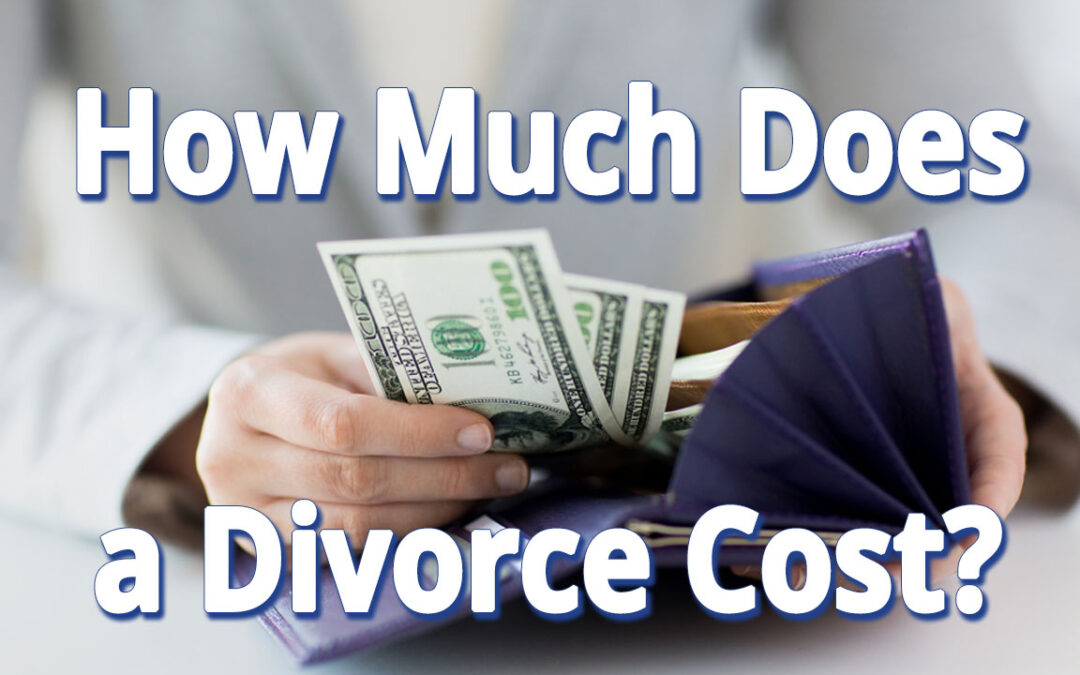
by Robert E. Hornberger, Esq | Jul 14, 2015
HOME ABOUT US OUR FIRM FIRM YOUR LEGAL TEAM ATTORNEYS YOUR ATTORNEYS ROBERT E HORNBERGER CHRISTINE M VERBITSKY ANNEMARIE LANNI LAWRENCE M. MARINO BRENDA LYNCH (Of Counsel) PRACTICE AREAS AREAS OF EXPERTISE What’s Involved In Divorce DIVORCE DIVORCE COLLABORATIVE...






















